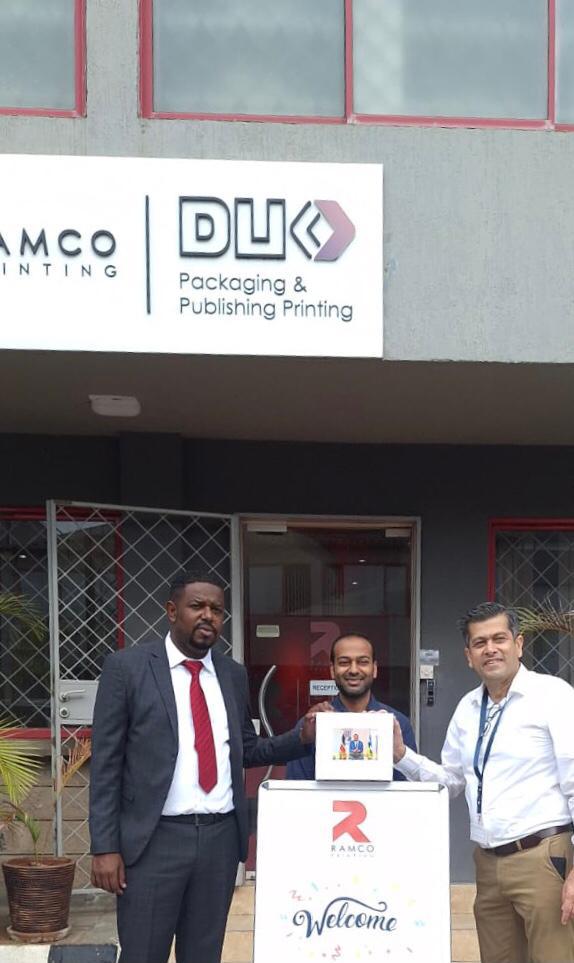Government Moves to Shield Local Publishing Sector as PS Abubakar Engages Industry Giants on Policy Reforms
NAIROBI, Kenya – Tuesday, June 3, 2025
In an ongoing renewed push to support local manufacturing and revive Kenya’s ailing publishing and print industry, the Principal Secretary for Investment Promotion, Abubakar Hassan Abubakar continued his strategic engagement tour with key industry players in Nairobi last week.
PS Abubakar acknowledged the validity of the concerns raised by the leadership of publishing industries in the country and reiterated the government’s commitment to creating an enabling environment for local manufacturers.
The tour, carried out in partnership with the Kenya Association of Manufacturers (KAM), is part of the State Department’s broader mission to identify and address critical investment bottlenecks hindering industrial growth.
Targeted firms included Ramco Printing Works, Kenafric Industries Limited and Twiga Stationers & Printers that have grown from modest, family-run ventures into major employers and manufacturers in Kenya’s print, packaging, and stationery sectors.
“Our focus is to understand the pain points of the publishing and printing industry and formulate policy solutions that support local value addition, protect local enterprises and position Kenya as a competitive investment destination,” said PS Abubakar during the visit.
The consultative meetings revealed a sobering outlook for the local publishing and stationery sector. Despite heavy investments in modern technology, employment and environmental sustainability, all three firms, reported a steady decline in sales particularly in the school stationery segment.
Twiga Stationers, reported a shrink of 50% market share despite a production capacity of 35,000 tonnes per annum and employment of over 700 people. The same concern was echoed by Kenafric Industries, whose stationery division has seen a decline in sales due to increased imports and operational costs.
“The biggest threat we are facing is the unregulated influx of cheap imported exercise books from Asia, especially China. These products are undercutting local manufacturers, making it difficult to compete despite our quality and capacity,” said Nilesh Shah, Managing Director of Twiga Stationers.
Ramco Printing, a leading player in commercial and digital printing, raised additional concerns over the rising costs of raw materials. The firm, which employs over 400 staff and operates two state-of-the-art printing units in Nairobi, highlighted the cost of Kraft paper, ink, and power as significant obstacles.
“We’ve invested heavily in innovation and sustainability. But without fiscal support and policy protection, our local industry remains vulnerable,” noted Mahmoud Saffiden, Managing Director of Ramco.
Through the Kenya Association of Manufacturers, the firms submitted several policy proposals to the Principal Secretary. These included a call to impose higher import duties or quotas on imported exercise books and have them listed as “sensitive products,” similar to the policy adopted in Uganda.
The publishers recommended exempting the sale of packaging materials such as bags from VAT to reduce the cost of locally manufactured goods. They also called for the removal of the 15% excise duty on printing ink, which stakeholders argued could reduce production costs by up to 20%. The team also called on the government to review the current 35% VAT and 10% export levy imposed on Kraft paper, the primary raw material used in packaging.
Miriam Bomet, KAM’s Head of Policy and Regulatory Affairs, called for urgent government intervention failure to which, will not only affect businesses but also result in job losses leading to weakened industrial base.
“These firms are critical to Kenya’s industrial ecosystem and national education value chain. They need a level playing field to compete, grow and expand investment,” said Bomet.
PS Abubakar affirmed that the Ministry of Investments, Trade and Industry was committed to partnering with the private sector to grow Kenya’s industrial base. Through investment promotion, the government will work with regulatory agencies, Parliament and Treasury to explore actionable solutions, including tariff reforms, tax incentives, and public-private investment models, he added.
The three firms showcased more than just their production capabilities but also presented a shared story of Kenyan resilience, innovation, and social impact. Each firm expressed a desire not just for survival, but for expansion through increased exports, regional penetration, and youth employment.
PS Abubakar promised the industry leaders to compile and forward all the recommendations to relevant government agencies for review and committed to engage with the Treasury, KRA, and KEBS, among others, to develop a coordinated response to the policy gaps.

